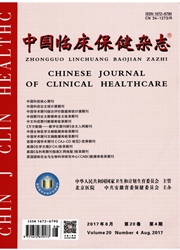

 中文摘要:
中文摘要:
目的:基于SF-36量表研究活动期强直性脊柱炎(AS)患者生活质量特点及其影响因素。方法:采用调查问卷的方式获得生活质量量表SF-36、AS患者疼痛严重性10cm水平视力对照法(VAS)、Bath疾病活动指数(BASDAI)、Bath功能指数(BASFI)、Bath整体指数(BAS-G)、焦虑自评量表(SAS)、抑郁自评量表(SDS)各项积分,将60例AS患者按活动期和非活动期的诊断标准,分别纳入活动期组和非活动期组,比较两组AS患者生活质量各维度积分,同时分析活动组AS患者的生活质量各维度积分与SF-36、VAS、BASDAI、BASFI、BAS-G、SAS、SDS积分和实验室指标(IgA、IgM、IgG、ESR、hs-CRP、α-AGP)的相关性。结果:1与非活动期AS患者的生活质量各维度积分比较,活动期AS患者的生理机能、生理职能、躯体疼痛、活力、社会功能、情感职能及精神健康积分均显著性降低(P〈0.05,P〈0.01)。2生活质量各维度积分与VAS、BASDAI、BASFI、BAS-G、SAS、SDS、IgA、ESR、hs-CRP成负相关(P〈0.05,P〈0.01);与IgM、IgG、α-AGP无相关性。结论:活动期AS患者生活质量显著下降,其与疾病的活动、躯体的疼痛、生理功能的受限、焦虑抑郁的情绪、免疫炎性反应关系密切,活动期AS患者注重心理干预和社会支持,对于提高患者生活质量尤为重要。
 英文摘要:
英文摘要:
Objective: To study ankylosing spondylitis (AS) patients' characteristics of life quality and its influencing factors based on the short form-36 (SF-36) scale. Methods: SF-36 scale, visual analog scale (VAS), bath ankylosing spondylitis disease active index (BASDAI), bath ankylosing spondylitis functional index (BASFI), bath ankylosing spondylitis global score (BAS-G), self-reported anxiety scale (SAS) and self-reported depression scale (SDS) were acquired by the way of questionnaire. 60 AS patients were divided into active stage group and inactive stage group according to the diagnostic criteria. The dimension integral of life quality in the patients of the two group was compared, and the correlation between integral of dimension, SF- 36, VAS, BASDAI, BASFI, BAS-G, SAS, SDS and laboratory indexes (IgA, IgM, IgG, ESR, hs-CRP, ct-AGP) was analyzed. Results: ①)Compared with patients in inactive stage group, the physiological function, role physical, body pain, vitality, social function, emotional function and integration of mental health of patients in active stage group were decreased significantly (P〈0.05, P〈0.01). ②Dimension integral of life quality was negatively correlated with VAS, BASDAI, BASFI, BAS-G, SAS, SDS, IgA, ESR and hs-CRP (P〈0.05, P〈0.01), and there was not relevant between dimension integral of life quality and IgM, IgG and ct-AGP. Conclusion: The life quality of patients in active stage is decreased significantly, and it closely related to disease activity, body pain, limited functions, anxiety and depression mood and immune-inflammatory responses. Psychological intervention and social support are especially important to improve the life quality of AS patients in active stage.
 同期刊论文项目
同期刊论文项目
 同项目期刊论文
同项目期刊论文
 Study on effects of Xinfeng capsule on pulmonary function in adjuvant arthritis rats base on Treg-me
Study on effects of Xinfeng capsule on pulmonary function in adjuvant arthritis rats base on Treg-me Effects of Xinfeng capsule(新风胶囊) on synovial inflammation induced adjuvant arthritis based on the T&
Effects of Xinfeng capsule(新风胶囊) on synovial inflammation induced adjuvant arthritis based on the T& 期刊信息
期刊信息
